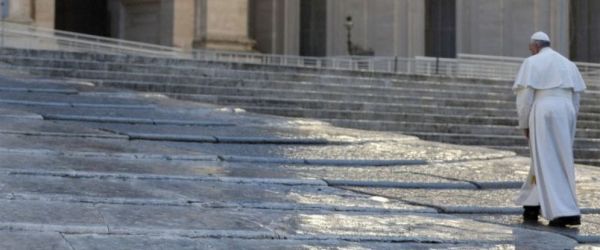The Gospel of this penultimate Sunday of the liturgical year offers us part of Jesus’ discourse regarding the last events of human history, oriented toward the complete fulfillment of the reign of God (cf. Mk 13:24-32). It is the talk that Jesus gave in Jerusalem before his last Passover. It has certain apocalyptic elements, such as wars, famine, cosmic catastrophes: “The sun will be darkened, and the moon will not give its light, and the stars will be falling from heaven, and the powers in the heavens will be shaken” (vv. 24-25). However, these segments are not the essential part of the message. The core around which Jesus’ words turn is he himself, the mystery of his person, and of his death and resurrection, and his return at the end of time.
Our final goal is the encounter with the Risen Lord. I would like to ask how many of you think about this. “There will be a day in which I meet the Lord face to face”. And this is our goal: the encounter. We do not await a time or a place, but we are going to encounter a person: Jesus. Thus the problem is not “when” these premonitory signs of the last days will occur, but rather our being prepared. Neither is it about knowing “how” these things will happen, but instead “how” we have to act today, in awaiting these things. We are called to live the present, building our future with serenity and trust in God. The parable of the fig tree that sprouts, as a sign of the approaching summer (cf. vv. 28-29), teaches that the perspective of the end doesn’t distract us from the present life, but rather brings us to look at our current days with an outlook of hope. This virtue of hope that is so hard to live. The smallest but strongest of the virtues. And our hope has a face: the face of the Risen Lord, who comes “with great power and glory” (v. 26), which will manifest his love, crucified and transfigured in the Resurrection. The triumph of Jesus at the end of time will be the triumph of the Cross, the demonstration that the sacrifice of oneself for love of neighbour, in imitation of Christ, is the only victorious power, the only stable point in the midst of the upheavals and tragedies of the world.
The Lord Jesus is not only the destination of our earthly pilgrimage, but also a constant presence in our lives; he is also beside us, he always accompanies. That’s why, when we speak of the future and project ourselves toward it, it is always in order to lead us back to the present. He counters the false prophets, the fortune-tellers who predict that the end of the world is near; he sets himself against fatalism. He is at our side; he walks with us; he loves us. He wants to remove from his disciples of every age the curiosity about dates, predictions, horoscopes, and focus their attention on the today of history. I would like to ask you — don’t answer out loud, each one answer to himself — how many of you read your horoscope every day? Each one answer, and when you feel like reading your horoscope, look to Jesus who is with you. This is better and will be better for you. This presence of Jesus calls us to the anticipation and vigilance that exclude both impatience and lethargy, both the escaping to the future and the becoming prisoners of the current moment and of worldliness.
In our days, too, there is no lack of natural and moral disasters, nor of adversities and difficulties of every kind. Everything passes, the Lord reminds us; he alone, his Word remains as the light that guides and encourages our steps. He always forgives us because he is at our side. We need only look at him and he changes our hearts. May the Virgin Mary help us to trust in Jesus, the firm foundation of our life, and to persevere with joy in his love.
[Pope Francis, Angelus 15 November 2015]












